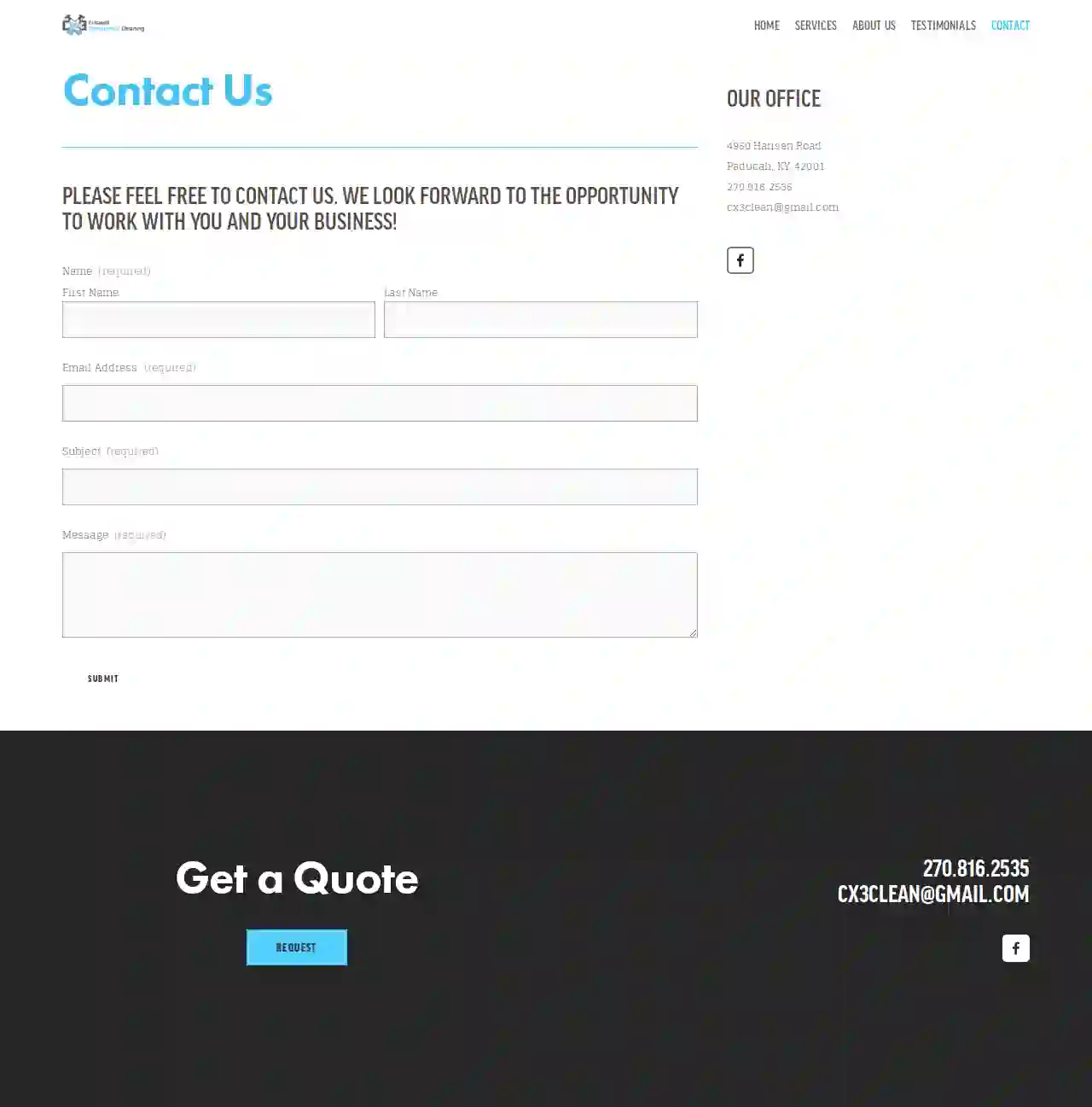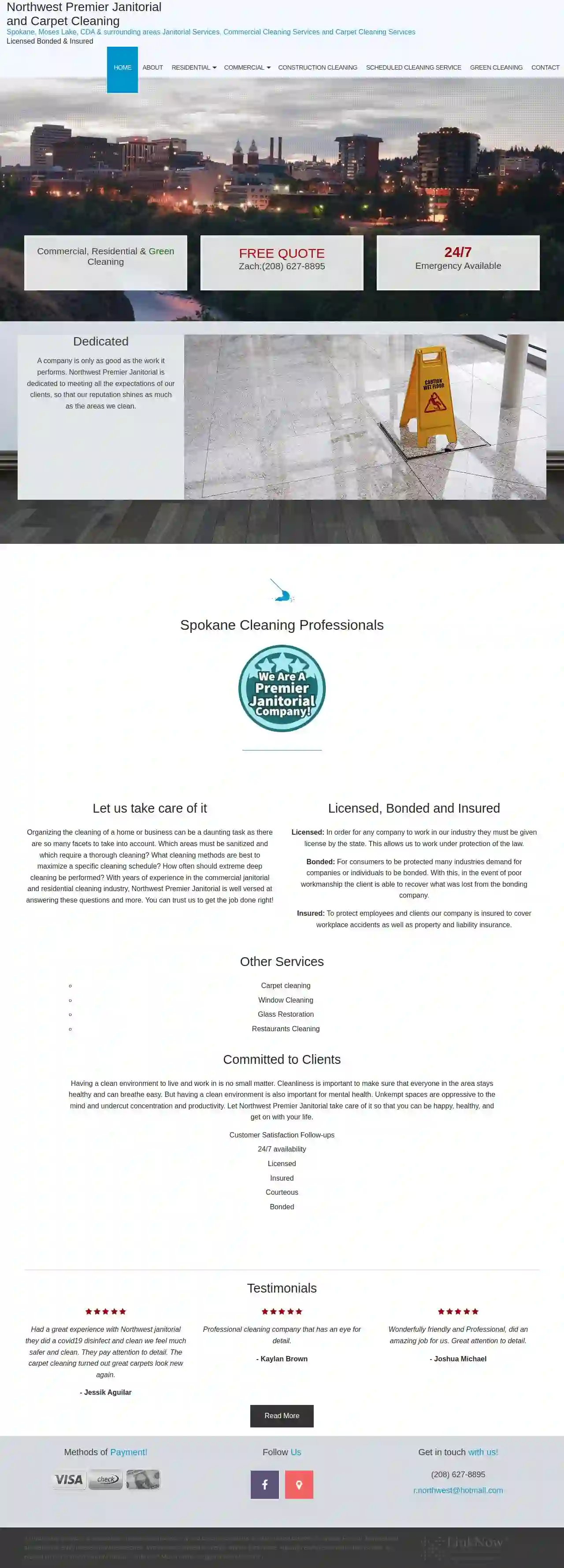Cleaning Services Cheney
Best Housekeeping Services in Cheney
Get up to 3 Housekeeping Services quotes for your project today! Compare profiles, reviews, accreditations, portfolio, etc... and choose the best deal.

Heavy Duty Janitorial
52 reviewsSeattle, USHeavy Duty Janitorial is a professional cleaning service that offers a variety of services including commercial, residential, and custom cleaning projects. With a dedicated team, they provide top-notch cleaning solutions tailored to meet the needs of their clients. Their commitment to quality and customer satisfaction is evident in their testimonials and reviews.
- Services
- Why Us?
- Our Team
- Testimonials
- Gallery
Get Quote
ServiceMaster Cleaning Services by Young
4.36 reviews3682 Dodge St., West Richland, 99353, USAt ServiceMaster Cleaning Services by Young, we provide commercial and residential restoration services to West Richland and surrounding areas. Our team of experts is dedicated to helping you recover from disasters such as fire, smoke, mold, water, and weather damage. We understand that your home or business is more than just a physical property, and we're here to provide personalized care and guidance to get your life back to normal as quickly as possible. With our expertise and state-of-the-art equipment, we can handle any size of loss, from small residential fires to large commercial disasters. Our services include water damage restoration, fire and smoke damage restoration, mold remediation, weather damage restoration, and specialty services such as odor removal. We're proud to serve the communities of Benton City, College Place, Connell, Echo, Eltopia, Grandview, Helix, Hermiston, Kahlotus, Kennewick, Mesa, Milton Freewater, Othello, Pasco, Paterson, Pendleton, and more. Contact us today to learn more about our services and how we can help you recover from disaster.
- Services
- Why Us?
- Accreditations
- Our Team
- Testimonials
- Gallery
Get Quote
CX3, LLC Criswell Commercial Cleaning
534 reviewsKent, US- Services
- Why Us?
- Gallery
Get Quote
Supreme Cleaning LLC
580 reviewsSeattle, US- Services
- Why Us?
- Gallery
Get Quote
Northwest Premier Janitorial
4.918 reviewsSpokane, US- Services
- Why Us?
- Gallery
Get Quote- Qu
Quality Custodial Services Inc
57 reviewsKent, US- Services
- Why Us?
- Gallery
Get Quote 
Monarca Clean - Commercial Cleaning Services
4.916 reviewsVancouver, US- Services
- Why Us?
- Gallery
Get Quote
Ultra-Tech Cleaning Systems (UTCS)
4.19 reviewsVancouver, US- Services
- Why Us?
Get Quote- En
Engage Perfect Cleaning
514 reviewsKennewick, US- Services
- Why Us?
Get Quote - Cl
Clockwork Cleaning Co LLC
59 reviewsOlympia, US- Services
- Why Us?
Get Quote
Over 60,241+ Janitorial Contractors in our network
Our janitorial services operate in Cheney & surrounding areas!
CleaningMatch has curated and vetted Top Cleaning Companies arround Cheney. Find a reliable pro today.
Frequently Asked Questions About Cleaning Services
- Residential Cleaning: Covers cleaning homes, apartments, and other living spaces.
- Commercial Cleaning: Focuses on cleaning offices, retail stores, and other business establishments.
- Deep Cleaning: A thorough and intensive cleaning that covers areas often neglected during regular cleaning.
- Move-In/Move-Out Cleaning: Comprehensive cleaning performed before or after moving into or out of a property.
- Post-Construction Cleaning: Specialized cleaning after construction or renovation projects to remove debris and dust.
- Specialized Cleaning: Includes services like carpet cleaning, window cleaning, upholstery cleaning, and more.
- Using the wrong cleaning products: Certain cleaning products are unsuitable for specific surfaces. Using abrasive cleaners on delicate surfaces can cause scratches or discoloration.
- Not reading product instructions: Always read and follow the instructions on cleaning products to ensure proper usage and avoid potential hazards.
- Using dirty cleaning tools: Dirty cloths, sponges, and mops can spread germs and dirt instead of cleaning them. Rinse and sanitize your cleaning tools regularly.
- Skipping ventilation: Proper ventilation is essential when using cleaning products, especially those with strong fumes. Open windows and doors to allow fresh air circulation.
- Not allowing sufficient drying time: After cleaning, allow surfaces to dry completely to prevent mold and mildew growth, particularly in humid areas like bathrooms.
- Ignoring clutter: Clutter makes cleaning more difficult and time-consuming. Declutter regularly to maintain a cleaner and more organized home.
- Experience: 'How long have you been in business, and what type of cleaning services do you specialize in?'
- Licensing and Insurance: 'Are you licensed, insured, and bonded? Can I see proof of coverage?'
- Background Checks: 'Do you conduct background checks on your employees?'
- Cleaning Supplies: 'Do you provide your own cleaning supplies and equipment, or should I provide them?'
- Cleaning Methods: 'What cleaning methods and products do you use?'
- References: 'Can you provide references from previous clients?'
- Scheduling and Availability: 'What days and times are you available for cleaning?'
- Pricing and Payment: 'What is your pricing structure, and what payment methods do you accept?'
- Cancellation Policy: 'What is your cancellation policy?'
- Satisfaction Guarantee: 'Do you offer a satisfaction guarantee? What happens if I'm not happy with the service?'
- Declutter Regularly: Set aside time regularly to declutter your belongings. Donate, sell, or discard items you no longer use or need.
- Designated Storage: Assign specific storage spaces for different items, such as shelves for books, drawers for clothes, and containers for toys.
- Labeling: Label storage containers and drawers to make it easy to find items and put them back in their designated places.
- 'One In, One Out' Rule: For every new item you bring into your home, get rid of an old one. This prevents clutter from accumulating.
- Vertical Storage: Utilize vertical storage solutions, such as shelves, wall organizers, and hanging racks, to maximize space.
- Digital Organization: Organize digital files and emails to reduce paper clutter. Use cloud storage services to free up space on your computer.
What are the different types of cleaning services?
The best type of cleaning service depends on your specific needs, the size and condition of the property, and your budget.
What are some common cleaning mistakes to avoid?
By avoiding these common cleaning mistakes, you can improve your cleaning efficiency and achieve better results.
What should I ask a cleaning service before hiring them?
By asking these questions, you can assess their professionalism, reliability, and suitability for your cleaning needs.
What are some tips for keeping my home organized and clutter-free?
By adopting these strategies, you can create a more organized and clutter-free home, promoting a sense of calm and efficiency.
What are the different types of cleaning services?
- Residential Cleaning: Covers cleaning homes, apartments, and other living spaces.
- Commercial Cleaning: Focuses on cleaning offices, retail stores, and other business establishments.
- Deep Cleaning: A thorough and intensive cleaning that covers areas often neglected during regular cleaning.
- Move-In/Move-Out Cleaning: Comprehensive cleaning performed before or after moving into or out of a property.
- Post-Construction Cleaning: Specialized cleaning after construction or renovation projects to remove debris and dust.
- Specialized Cleaning: Includes services like carpet cleaning, window cleaning, upholstery cleaning, and more.
The best type of cleaning service depends on your specific needs, the size and condition of the property, and your budget.
What are some common cleaning mistakes to avoid?
- Using the wrong cleaning products: Certain cleaning products are unsuitable for specific surfaces. Using abrasive cleaners on delicate surfaces can cause scratches or discoloration.
- Not reading product instructions: Always read and follow the instructions on cleaning products to ensure proper usage and avoid potential hazards.
- Using dirty cleaning tools: Dirty cloths, sponges, and mops can spread germs and dirt instead of cleaning them. Rinse and sanitize your cleaning tools regularly.
- Skipping ventilation: Proper ventilation is essential when using cleaning products, especially those with strong fumes. Open windows and doors to allow fresh air circulation.
- Not allowing sufficient drying time: After cleaning, allow surfaces to dry completely to prevent mold and mildew growth, particularly in humid areas like bathrooms.
- Ignoring clutter: Clutter makes cleaning more difficult and time-consuming. Declutter regularly to maintain a cleaner and more organized home.
By avoiding these common cleaning mistakes, you can improve your cleaning efficiency and achieve better results.
What should I ask a cleaning service before hiring them?
- Experience: 'How long have you been in business, and what type of cleaning services do you specialize in?'
- Licensing and Insurance: 'Are you licensed, insured, and bonded? Can I see proof of coverage?'
- Background Checks: 'Do you conduct background checks on your employees?'
- Cleaning Supplies: 'Do you provide your own cleaning supplies and equipment, or should I provide them?'
- Cleaning Methods: 'What cleaning methods and products do you use?'
- References: 'Can you provide references from previous clients?'
- Scheduling and Availability: 'What days and times are you available for cleaning?'
- Pricing and Payment: 'What is your pricing structure, and what payment methods do you accept?'
- Cancellation Policy: 'What is your cancellation policy?'
- Satisfaction Guarantee: 'Do you offer a satisfaction guarantee? What happens if I'm not happy with the service?'
By asking these questions, you can assess their professionalism, reliability, and suitability for your cleaning needs.
What are some tips for keeping my home organized and clutter-free?
- Declutter Regularly: Set aside time regularly to declutter your belongings. Donate, sell, or discard items you no longer use or need.
- Designated Storage: Assign specific storage spaces for different items, such as shelves for books, drawers for clothes, and containers for toys.
- Labeling: Label storage containers and drawers to make it easy to find items and put them back in their designated places.
- 'One In, One Out' Rule: For every new item you bring into your home, get rid of an old one. This prevents clutter from accumulating.
- Vertical Storage: Utilize vertical storage solutions, such as shelves, wall organizers, and hanging racks, to maximize space.
- Digital Organization: Organize digital files and emails to reduce paper clutter. Use cloud storage services to free up space on your computer.
By adopting these strategies, you can create a more organized and clutter-free home, promoting a sense of calm and efficiency.